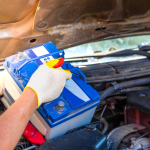Buying a used car can be both an exciting adventure and a daunting task. With countless options, varying prices, and the potential for hidden issues, navigating the used car market can feel overwhelming. However, with the right knowledge and strategies in your back pocket, you can approach this process with confidence and ease. In this article, we’ll share essential tips to help you make an informed decision, ensuring you find a reliable vehicle that fits your budget and lifestyle. Whether you’re a first-time buyer or a seasoned pro, these friendly insights will guide you toward a successful purchase, allowing you to hit the road with peace of mind. Let’s get started on finding your perfect used car!
Table of Contents
- Understanding Your Budget and Financing Options
- Identifying Reliable Sources for Used Cars
- Conducting a Thorough Inspection and Test Drive
- Navigating Negotiations and Closing the Deal
- Q&A
- Wrapping Up
Understanding Your Budget and Financing Options
Before embarking on your journey to purchase a used car, it’s crucial to have a comprehensive understanding of your financial landscape. Start by evaluating your current financial situation, including your income, existing debts, and essential living expenses. This assessment will help determine how much you can realistically allocate towards your vehicle purchase. Consider using a budget calculator to get a clearer picture. Key factors to keep in mind:
- Down Payment: A larger upfront payment can reduce monthly installments.
- Insurance Costs: Factor in the cost of insurance, as it can vary significantly based on the model.
- Maintenance and Repairs: Set aside a budget for potential repairs or routine maintenance to keep your vehicle in optimal condition.
When considering financing options, it’s important to research various possibilities to find the best fit for your situation. You can explore traditional loans from banks or credit unions, which typically offer competitive interest rates. Additionally, many dealerships provide financing programs that may include incentives or special deals. Be sure to compare rates and terms. Here’s a simple breakdown of financing options:
| Financing Option | Pros | Cons |
|---|---|---|
| Bank/Credit Union Loan | Lower interest rates, flexible terms | Requires good credit |
| Dealership Financing | Convenient, potential discounts | May have higher interest rates |
| Personal Loan | Can be used for any purpose | Higher interest rates compared to secured loans |
Identifying Reliable Sources for Used Cars
When searching for a used car, it’s crucial to pinpoint trustworthy sources to ensure you’re making a sound investment. Consider checking out reputable online platforms that specialize in vehicle sales. Websites like Cars.com, Autotrader, and CarGurus not only list numerous options but also offer user reviews and detailed vehicle histories. Additionally, local dealerships with certified pre-owned programs provide an extra layer of assurance, as these cars often undergo rigorous inspections and come with warranties.
Furthermore, don’t overlook the value of offline sources. Engaging with friends, family, or colleagues can lead you to reliable recommendations. Be sure to check local classifieds and community bulletin boards for potential finds. Here’s a simple checklist to help evaluate a source:
| Source | Reliability Indicators |
|---|---|
| Online Marketplaces | Extensive listings, customer reviews, vehicle history reports |
| Local Dealerships | Certified pre-owned options, warranties, return policies |
| Personal Recommendations | Trustworthy referrals, previous purchase experiences |
Using this approach will help you navigate the diverse landscape of used car sales and ensure that your purchase is both confident and informed.
Read More: 4 Tips to Help you Survive when Your Vehicle is Going Underwater
Conducting a Thorough Inspection and Test Drive
When considering a used car, a thorough inspection is essential to ensure you’re making a wise investment. Start with a visual examination of the exterior and interior. Look for signs of rust, dents, or mismatched paint, as these can indicate previous accidents. Don’t overlook the tires; ensure they have even wear and sufficient tread depth. Check under the hood for any leaks or corrosion, and inspect the battery condition. Make a checklist for the features to verify:
- Fluid Levels: Oil, coolant, brake fluid.
- Belts and Hoses: Look for cracks or frays.
- Brakes: Listen for unusual noises while testing.
- Lights: Ensure all headlights, brake lights, and turn signals work.
A comprehensive test drive is just as critical. Aim for a mix of driving conditions—highway speeds, city traffic, and possibly rough roads—to gauge how the vehicle handles. Pay attention to the steering and suspension; they should feel responsive and stable. Check the transmission by shifting through gears smoothly, and observe how the engine performs under acceleration. Additionally, consider documenting your experience in a simple table to keep track of your impressions:
| Feature | Observation |
|---|---|
| Steering | Responsive / Loose / Vibrates |
| Braking | Firm / Soft / Noisy |
| Acceleration | Smooth / Jerky / Delayed |
| Comfort | Spacious / Cramped / Noisy |
Navigating Negotiations and Closing the Deal
One effective technique is to highlight any imperfections you noticed during your inspection. Whether it’s a scratch on the paint or slightly worn tires, pointing these out can justify your offer and possibly lower the asking price. Keep your budget in mind and be prepared to walk away if the deal doesn’t meet your expectations. Closing the deal comes down to finding common ground, so show your willingness to compromise within your budget. Consider adding a written agreement of terms before shaking hands to ensure both parties are on the same page.
| Negotiation Tactics | Purpose |
|---|---|
| Start with a lower offer | Creates negotiation space |
| Highlight vehicle imperfections | Justifies your price |
| Be friendly and collaborative | Builds rapport with the seller |
| Have a budget in mind | Ensures you don’t overspend |
Q&A
Q&A:
Q1: What should I consider first when I’m planning to buy a used car?
A1: Before diving into the used car market, it’s important to assess your needs and budget. Think about how you’ll use the used car—commuting, family trips, or off-roading? Next, determine your budget, keeping in mind not just the purchase price but also insurance, taxes, fuel, and maintenance costs.
Q2: How can I research the right used car for me?
A2: Start by researching the makes and models that fit your criteria. Check online resources, such as automotive websites and forums, to read reviews and ratings. Sites like Kelley Blue Book and Edmunds can provide valuable insights into reliability, ownership costs, and market value.
Q3: What’s the importance of Vehicle History Reports, and how do I obtain one?
A3: A Vehicle History Report (VHR) provides crucial information about a used car’s past, including accidents, title status, service records, and mileage verification. You can obtain a VHR by entering the used car’s VIN (Vehicle Identification Number) on sites like Carfax or AutoCheck. This report can help you avoid potential headaches down the road.
Q4: Should I always get a pre-purchase inspection?
A4: Absolutely! A pre-purchase inspection by a trusted mechanic can uncover hidden issues that might not be apparent during a test drive. It’s a small investment that can save you from unexpected repair costs later. Always ask the seller for permission to have the inspection done.
Q5: What should I keep in mind during the test drive?
A5: During your test drive, pay attention to how the car handles, the comfort of the seats, and any unusual noises. Test all features—like air conditioning, infotainment, and navigation systems—to ensure they work properly. Drive on various road conditions, such as highways and bumpy streets, to get a feel for the car’s performance.
Q6: How do I negotiate the price effectively?
A6: Start by knowing the fair market value of the car based on your research. Be polite but firm when presenting your offer, and be prepared to walk away if the deal doesn’t meet your expectations. Don’t hesitate to point out any issues uncovered during the inspection as leverage in your negotiations.
Q7: Are there financing options for used cars?
A7: Yes, there are several financing options available, including loans from banks, credit unions, and dealerships. Make sure to compare interest rates and terms to find the best deal. It’s also wise to get pre-approved for a loan before shopping, which can give you a better understanding of your budget.
Q8: What are the potential pitfalls I should be aware of?
A8: Be cautious of cars with salvage titles, as they could indicate severe damage. Avoid rushing into a purchase—take your time to thoroughly inspect the car and consider all options. Always read the fine print, especially regarding warranties and return policies.
Q9: How can I ensure a smooth transition after buying the car?
A9: Once you’ve made your purchase, ensure that you complete the necessary paperwork, including title transfer and registration. Don’t forget to set up insurance before taking the car home. It’s also a good idea to familiarize yourself with the owner’s manual to understand maintenance schedules and features.
Q10: Any final tips for a successful used car buying experience?
A10: Stay patient and trust your instincts. Don’t feel pressured to buy on the spot. If something doesn’t feel right, it’s okay to keep looking. Buying a used car can be a rewarding experience if you take the time to educate yourself and make informed decisions!
Wrapping Up
buying a used car can be a rewarding and cost-effective choice if approached with the right mindset and preparation. By keeping these essential tips in mind—such as doing thorough research, setting a realistic budget, and conducting a comprehensive inspection—you empower yourself to make an informed decision that aligns with your needs and lifestyle. Remember, the goal is not just to find a car, but to find the right car for you. Take your time, trust your instincts, and don’t hesitate to seek assistance from trusted friends or mechanics if needed. Happy car shopping! May your next ride bring you many memorable journeys ahead!











